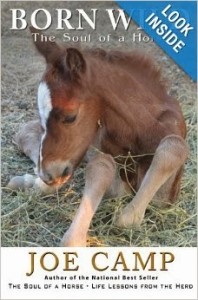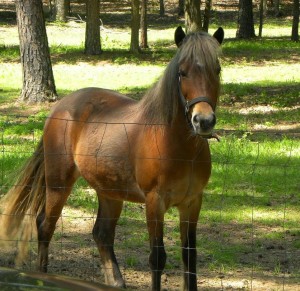Joe Camp
File Size: 19086 KB
Print Length: 274 pages
Publisher: 14 Hands Press (December 2, 2013)
Sold by: Amazon Digital Services, Inc.
Language: English
ASIN: B00G5UPLR6
Joe Camp has done it again with the sequel to the National Best Seller
The Soul of a Horse – LifeLessons from the Herd. When I read that first book about how to establish a trusting relationship with a horse, I went out to the pasture with my horse and Joined Up – a technique of horsemanship that lets the horse choose you and starts a training process that does not involve fear.
This latest book is another story about trust; about how you can build stronger relationships with all animals, including people, by first forming that trusting bond. It means focusing on the needs and wants of the other person, or in the case of animal training, the animal. Advice that Joe repeats for emphasis is, “Relationship first continues to be the key. And the relationship is not set until the horse makes the choice, of her own free will, to say
I trust you to be my leader. That’s when everything changes for the better.”
In Born Wild, Camp chronicles the experiences he and his wife, Kathleen, have had after adopting two wild mustang mares who were pregnant and raising the foals. As he states in the book, “This was uncharted territory for us,” and he shares the good and the bad and the ugly with his engaging narrative style. His passionate love of animals resonates throughout each chapter, and, like he did in The Soul of a Horse, he includes chapters that are presented from the POV of a herd of wild horses that is trying to survive on land that is supposed to belong to the wild mustangs and burros. Those chapters are fiction, of course, but it gives insight into the way horses are meant to live and how they can thrive in an environment closer to what is natural for them.
“The bottom line is that whenever there is a question about lifestyle, diet, feet, behavior, or just about anything else related to the horse, the answer can be found in the answer to this question. What would the horse be doing for himself if he were living in the wild of the American West? Because every horse on the planet was born wild. And genetically speaking still is. By no means does any of this imply a life without humans. The horse loves to be in a relationship. Prefers it. Even with us humans, if the relationship is approached with understanding, respect, and compassion.”
Born Wild takes the Bureau of Land Management (BLM) to task for its treatment of the wild mustangs and burros.
The Wild Free-Roaming Horse and Burro Act of 1971 allocated land for the preservation and protection of these wild species, and the BLM is charged with enforcing that law. However, instead of upholding the law, the agency moves the horses to smaller areas so the land can be leased to ranchers for forage for their cattle and sheep. The fees the ranchers pay are much less than if they were to lease the land from private land owners, It costs the taxpayers $65 million a year to support the current approach to management, and if the wild horses were simply allowed to live free on the land that was allocated to them, the cost would be considerably less.
Not only is the poor use of taxpayer money of significant concern, the roundups are handled in such a way that the horses suffer and many of the very young horses die. It is also terribly frightening for an animal that is prey, such as a horse, to be chased by helicopters. Horse advocates such as
Ginger Kathrens have documented the cruelty to the horses and have video that shows the helicopters hovering just feet above the running horses. She has made several documentary films that are well worth watching.
The way the animals are treated is a situation that Joe and Kathleen Camp find deplorable, and therefore they spend part of their time and effort working with others to try to spread the word that the current BLM program should be changed. That is part of the reason they have written this book, to shed a light on the problems and encourage people to become part of the solution, but the book is so much more than that. It is a testament to the love between a man and his horse that has been part of legend and lore for so many years. Joe Camp, and others like him who take a natural respectful approach to horsemanship, are just raising the bar.
You don’t have to own a horse or even love a horse to be able to appreciate the messages in this book because the bottom line of trust is so important in any relationship. But if you do own a horse, reading this book could forever change the way you think about and interact with your four-legged friend.
~~~~~~~~~~~~~~~~


